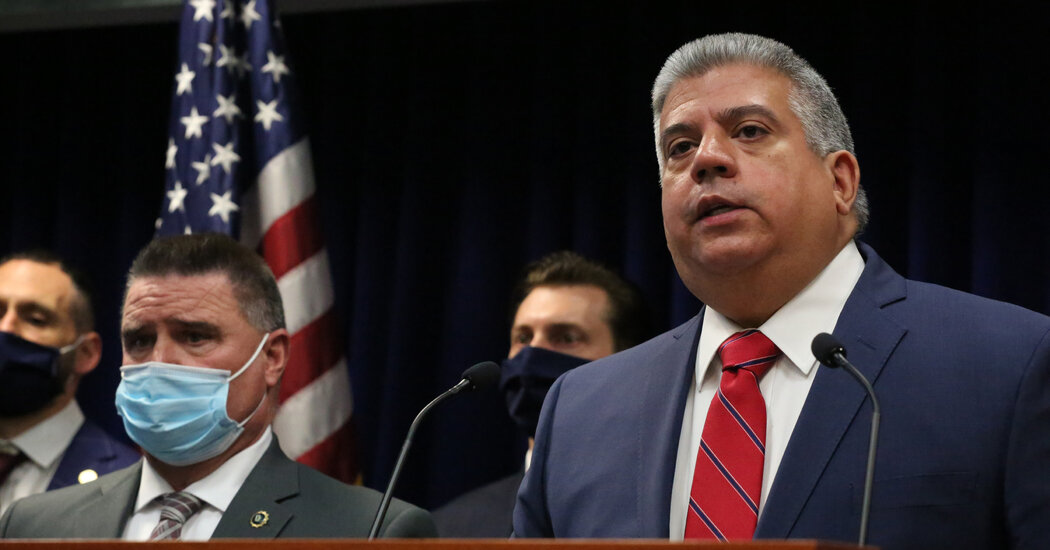Brooklyn Prosecutors Seek to Throw Out Scores of Convictions

Brooklyn prosecutors are seeking to throw out 378 criminal convictions — mostly low-level drug and traffic offenses, dating to 1999 — that relied on the work of 13 former New York Police Department officers who were later convicted of crimes related to their work.
On Wednesday, Eric Gonzalez, the district attorney in Brooklyn, asked a state judge to vacate the first 15 convictions, all of which involved felonies and several of which resulted in prison time, according to the prosecutor’s office and the Legal Aid Society. Mr. Gonzalez’s office will seek to dismiss the remaining cases over the next few weeks.
The move is part of an effort by city prosecutors to review cases, even decades old, that involved discredited police officers. It reflects a broader push to scrutinize police testimony and a recognition of the catastrophic effects that even misdemeanor convictions can have on people.
“These convictions continue to hang around people and impact them in all kinds of ways,” Mr. Gonzalez said. “Had we known about these officers, we would never have brought these cases.”
Elizabeth Felber, supervising attorney with the wrongful conviction unit at the Legal Aid Society — a nonprofit that represents 11 defendants whose cases will be vacated and dismissed this week — noted several “collateral consequences” of the convictions: loss of public housing, barriers to employment, and deportation.
The Brooklyn review has been underway since last year and grew out of the office’s review of cases involving a former narcotics detective, Joseph E. Franco, who was charged with perjury and other offenses in connection with his undercover work and testimony for prosecutors. In April 2021, Mr. Gonzalez asked the court to dismiss 90 convictions involving Mr. Franco.
Mr. Franco, who was fired by the Police Department, is awaiting trial in Manhattan.
Last spring, several defense and civil rights organizations sent a letter to the city’s five district attorneys and the special narcotics prosecutor, identifying 20 police officers who had been convicted of crimes and two others who had engaged in work-related misconduct.
The letter asked the offices to review and erase convictions in which the officers played a role. Last fall, Melinda Katz, the Queens district attorney, moved to dismiss 60 cases based on the work of three former detectives. Earlier this year, the Bronx district attorney vacated 90 convictions involving Mr. Franco, as part of that office’s review of compromised cases.
The police department did not respond to a request for comment. None of the 13 officers involved in the Brooklyn cases remain on the force.
All of the officers were convicted of crimes that involved abuse of power, prosecutors said — mostly during undercover work and street level policing.
“Quick hits with little oversight,” said Charles Linehan, a former Manhattan prosecutor who has run the Brooklyn district attorney’s conviction review unit since January. “They almost do more damage in terms of eroding people’s trust and confidence in the system.”
Of the Brooklyn cases, 331 were misdemeanor convictions and 47 were felonies. About half of them involved four officers who were involved in a corruption scandal that rocked the police department’s narcotics operations in Brooklyn more than a decade ago. In that case, officers were found to have planted evidence, falsified records and provided drugs to informants.
One of those officers, Jerry Bowens, was charged with killing his girlfriend while he was facing charges arising from the corruption case. He pleaded guilty in 2011 and was sentenced to a prison term of a minimum 37 years.
Mr. Bowens, now 56, was the central police officer in 134 of the cases that the Brooklyn prosecutors aim to dismiss.
Another 78 cases on the prosecutors’ list arose from two officers who pleaded guilty in 2019 to charges that they released an 18-year-old from custody in exchange for sexual favors.
The office’s conviction integrity unit reviewed every Brooklyn conviction in which the 13 former officers were involved, flagging for dismissal cases in which they served as the primary witnesses. About 100 convictions were allowed to stand, prosecutors said, after the office determined that other corroborating evidence existed aside from the officers’ testimony.
